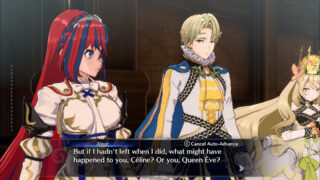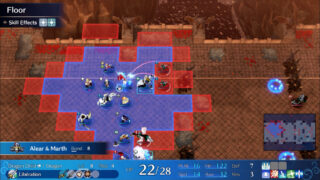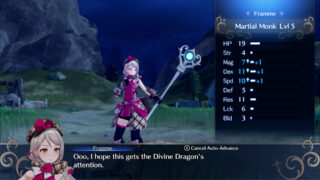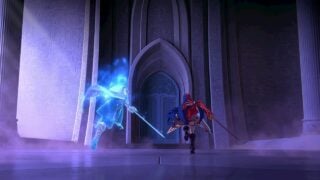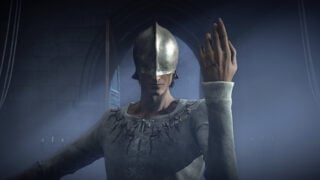Fire Emblem Engage’s opening hours are heavy on fan service, but light on challenge
So far, Fire Emblem Engage feels like it’s putting all of the pieces on the board, readying its first big move

If you recognize every character in Fire Emblem Engage, you probably run the fan wiki.
Intelligent System’s upcoming strategy game follows The Divine Dragon Alear, a character who awakes generations after a pivotal battle in the game’s opening, where they fought alongside other lords from the series, such as Marth, Celica, Roy and more.
And from what we’ve played so far, we’re enjoying it, even though it’s a bit simple and slow-going to begin with, and the narrative is leaning heavily on a parade of cameos.
The early game introduces the player to the Emblem rings, which allow wearers to summon the spirits trapped within. Thankfully, for san service reasons, these are protagonists from previous Fire Emblem games, the first of which, Marth, becomes a ghostly companion to your character, and can be used in battle to improve your attacks.
More Fire Emblem Engage Guides:
Dining Guide | Spirit of Somniel |How to rewatch cutscenes | amiibo unlocks | Somniel guide | Steel location | Iron location | Gift guide
The inclusion of previous characters cuts both ways. For fans who’ve been into the series before it was even officially released on these shores, it’s hugely celebratory of the franchise, with plenty of scope to pile on even more references and easter eggs for the Fire Emblem loyal by increasing your bond with each emblem.
But for those looking to get into Fire Emblem for the first time, we could see the opening of the game feeling incredibly overwhelming, especially as the game seems to introduce a new character with every other line of dialogue during the first few chapters.
The game does at least try to balance telling you why these old characters are important with the task at hand, although it’s not entirely graceful. Fire Emblem Engage is a strategy game wherein you direct a party of characters to attack enemies on the field, while (usually) progressing toward a more powerful enemy at the end of the stage.
The goal so far is to unite all of the Emblem rings to prepare for the showdown with the Fell Dragon, an ancient evil that was defeated long ago, but has begun to show signs of life. Your party has to travel to all realms of the kingdom to collect the rings which have been entrusted to various royal families for safekeeping.
Battles in the opening chapters are extremely easy, even on the higher difficulties. Your party is so well matched to the enemies that very little thought has to go into defeating them, and they rarely strategize in a way that’s tough to break down. You rather quickly add more heroes that can utilize the hugely powerful Emblem rings, making the situation even less perilous than before.
On the off chance you do get stuck, or you lose one of your party members in using the perma-death option, it’s possible to reverse time in order to play out a turn differently. Since the AI never sets a strategic trap in the early game that can’t be undone by running a character to the other side of the screen, we found ourselves using it only once in the opening 8 chapters, mainly due to a lack of concentration which meant we healed the wrong character, rather than a particularly feisty foe.
“The goal so far is to unite all of the Emblem rings to prepare for the showdown with the Fell Dragon, an ancient evil that was defeated long ago, but has begun to show signs of life.”
That’s not to say the combat isn’t enjoyable, it’s just all a bit simple in the early hours. The combat animations themselves look great, especially when summoning the lords of previous games. You will, eventually, start to skip them, but they’re suitably epic the first few times, and we always looked forward to meeting a new lord in order to see what their fancy animation would bring.
It’s probably a good thing that the battles are so simple the in the first chapters because the game is throwing so much lore and so many characters at you that anything else would feel overwhelming. There are far too many characters introduced, as the game seems to forget at times that not everyone playing Fire Emblem Engage has Wikipedia open on their phone.
When out of battle, you can chat to and increase your bond with these characters in the Somniel, a hub area that features your shop, armory, blacksmith, and other useful NPCs. The more you use a character in battle, the stronger your bond with them will become, allowing for new conversations to unlock in the Somniel, which lead to new attacks, weapons and more.

The Somniel will hopefully be key on harder difficulties, as if there’s no incentive to go after these stronger weapons via the bond system, we could see some players ignoring it, as you’re very rarely forced to return.
So far, Fire Emblem Engage feels like it’s putting all of the pieces on the board, readying its first big move. While this is appropriate for a game that’s like anime chess at times, there’s a slow pace to the five or six hours we’ve seen thus far that won’t be for everyone.
We really appreciate the inclusion of classic characters, and for the hardest of hardcore Fire Emblem fans, Engage feels like an Avengers: Endgame level of cameo spam, but this could put off people picking up the series for the first time.
We’re just starting to get into the weapon upgrade system, the repeatable skirmish battles, and the seemingly deep relationship system, but it’s currently unclear how those elements play into the actual gameplay, as so far it hasn’t been hugely evident beyond some occasional in-battle boosts.
As we cross into what is seemingly the second major act of Fire Emblem Engage, we’re enjoying the game, but we’re waiting for it to crank up the pressure. The combat is fun, we just wish it offered more of a challenge, and while the story is interesting so far, the actual plot is getting a bit lost behind the sheer volume of character introductions.


